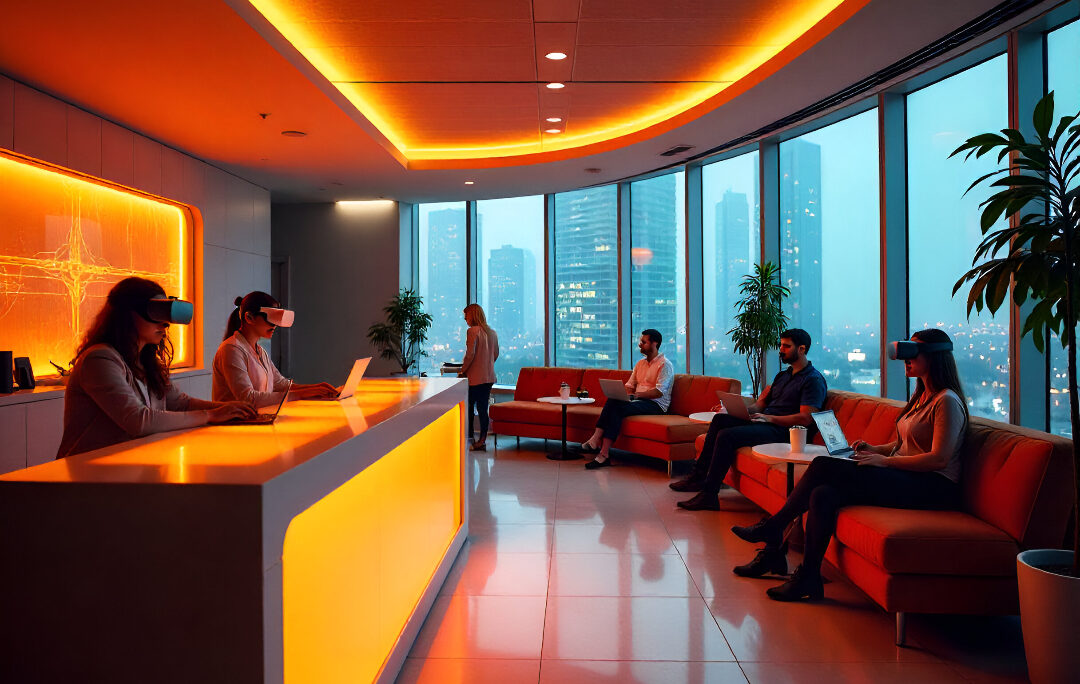Remote work isn’t a trend anymore—it’s the new normal. But as the dust settles post-pandemic, 2025 is proving something bigger: remote work is evolving into an ecosystem. It’s no longer just about “working from home.” Now it’s about where you work, how you work, and how immersive your work can be.
That’s where hybrid hotels and VR workspaces come in. They’re not buzzwords—they’re the new frontiers reshaping how we live and collaborate.
1. Hybrid Hotels: Where Business Meets Lifestyle
Hotels used to be stopovers for business travelers or vacationers. In 2025, they’re becoming work-hubs for digital nomads. Think chic coworking lounges, high-speed fiber Wi-Fi, podcast rooms, and even private Zoom-ready suites.
Spaces like Selina Hotels and CitizenM are leading this charge, blending hospitality with long-term work stays (Selina Nomad Pass). Instead of staying at an Airbnb and hunting down a café with decent Wi-Fi, workers now have everything under one roof.
Why it works:
- You get community + networking baked in.
- Amenities are designed for productivity.
- Flexible stays make it easy to switch cities without losing workflow.
Hybrid hotels aren’t just comfy—they’re strategic hubs for remote workers who want both professional infrastructure and a lifestyle upgrade.
2. The Rise of VR Workspaces
If hybrid hotels give us physical hubs, VR workspaces redefine the digital side. No more static Zoom calls or boring Slack threads. In VR, meetings happen in immersive environments—whiteboards, prototypes, even avatars that mimic gestures.
Platforms like Meta Horizon Workrooms (Meta Workrooms) and Spatial.io are already offering this in 2025. VR isn’t just “fun tech” anymore—it’s about presence without physical travel.
Why it matters:
- Remote teams actually feel “in the same room.”
- Brainstorming is dynamic—you can sketch in 3D, drag objects, or present data visually.
- It reduces Zoom fatigue, because interactions feel more natural.
For creative industries—design, architecture, marketing—VR workspaces are game changers. Imagine pitching a campaign in a virtual showroom instead of a slide deck.
3. Why Workers Want Hybrid + VR
In 2025, remote workers crave connection without compromise. They don’t want to give up freedom, but they also don’t want isolation. Hybrid hotels and VR workspaces solve this by:
- Offering social interaction + global networks
- Removing the “café hunt” stress
- Making collaboration immersive, not flat
- Supporting work-life balance (wellness classes, rooftop meetups, meditation pods)
According to FlexJobs, over 80% of remote workers report that flexibility improves both productivity and satisfaction. Hybrid hotels and VR just amplify that flexibility.
4. How Companies Benefit
This isn’t just about workers—it’s about employers too. Businesses embracing these models see:
- Lower overheads (no need for massive office leases)
- Happier employees (less burnout, more creativity)
- Access to global talent (hire anywhere, anytime)
Some companies even subsidize hybrid hotel stays for employees who want a change of scene, like an offsite without the conference planning headache. Others are experimenting with VR onboarding—training new hires in a simulated office to foster culture from day one.
Case in point: PwC’s VR training study found employees trained in VR learned 4x faster than in classroom settings.
5. Challenges: Not All Smooth Sailing
Of course, it’s not perfect. Hybrid hotels and VR bring challenges:
- Cost barriers: Not every worker can afford premium hotel passes.
- Tech fatigue: VR headsets aren’t always comfortable for long sessions.
- Access inequality: Rural workers may lack high-speed internet to fully use these setups.
- Corporate hesitation: Some companies still resist shifting away from traditional office culture.
But like any innovation, early adopters push the curve. By 2025, more affordable packages and lightweight VR gear are already in the works (HTC Vive XR Elite).
6. What It Means for the Future of Work
Hybrid hotels and VR workspaces are building a third place for work—not home, not office, but something in-between. They’re flexible, immersive, and global-first.
We’re moving toward:
- Fluid careers (work while traveling the world)
- Immersive collaboration (VR brainstorms that beat flat video calls)
- Experience-driven work culture (networking, lifestyle, and productivity bundled together)
For Gen Z and younger millennials, this is the default mode—why settle for cubicles when you can work from a Bali rooftop or brainstorm in a VR boardroom?
7. How to Prepare (as a Worker or Employer)
If you’re a worker:
- Try hybrid hotel passes like Selina Nomad Pass or Outsite.
- Experiment with VR collaboration platforms like Spatial.io or Meta Workrooms.
- Build a remote routine that balances focus + flexibility.
If you’re an employer:
- Test hybrid hotel partnerships for employee perks.
- Pilot VR training programs (start with onboarding).
- Focus on culture + human connection—don’t let tools replace the human layer.
Hybrid and VR models aren’t trends—they’re becoming core strategies for modern workforces.
Final Thought
The future of work in 2025 is hybrid, immersive, and borderless. Hybrid hotels are giving remote workers physical homes for productivity, while VR workspaces are tearing down digital walls for collaboration.
It’s not about choosing one or the other. It’s about mixing physical and virtual environments to build better, more human work cultures.
At the end of the day, work is no longer tied to cubicles, offices, or even zip codes. It’s tied to freedom, creativity, and experience. And that’s a future worth building.





